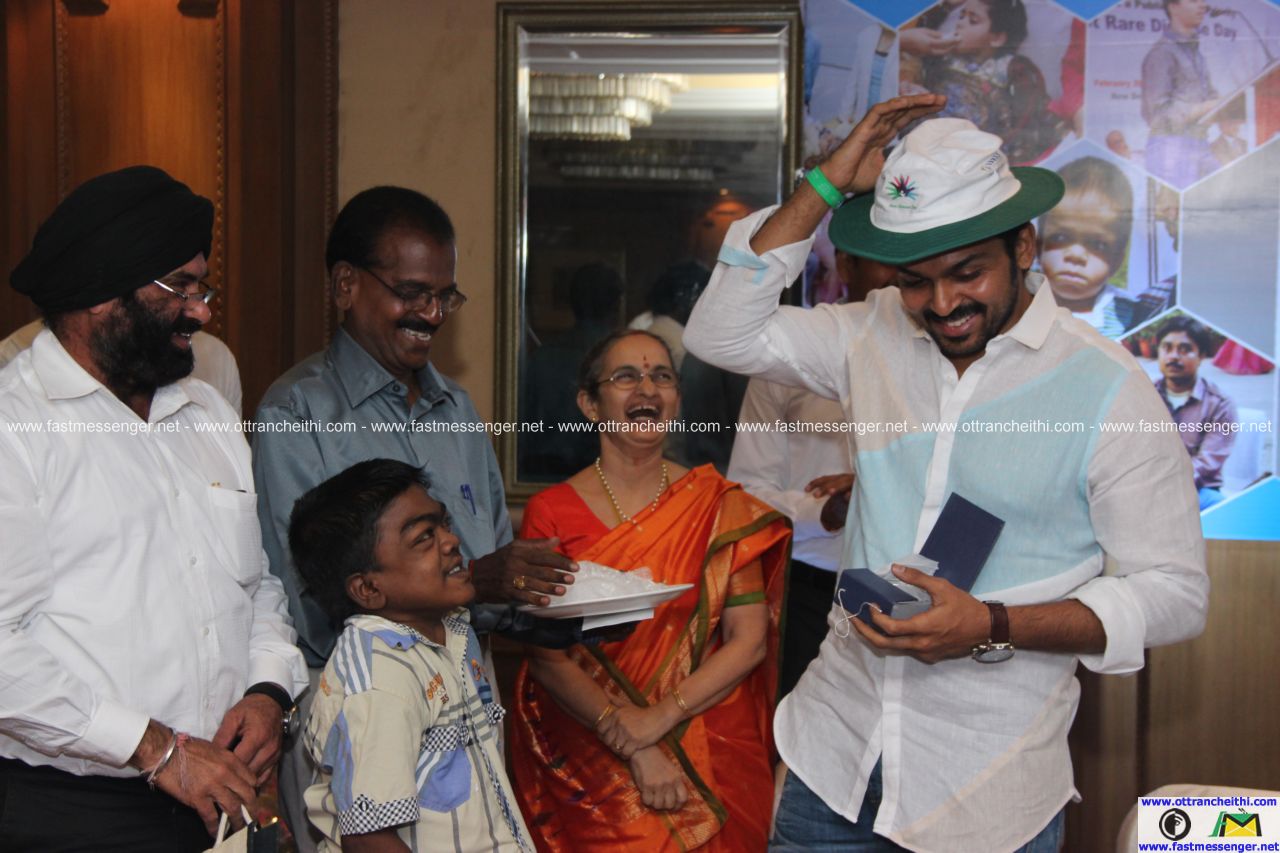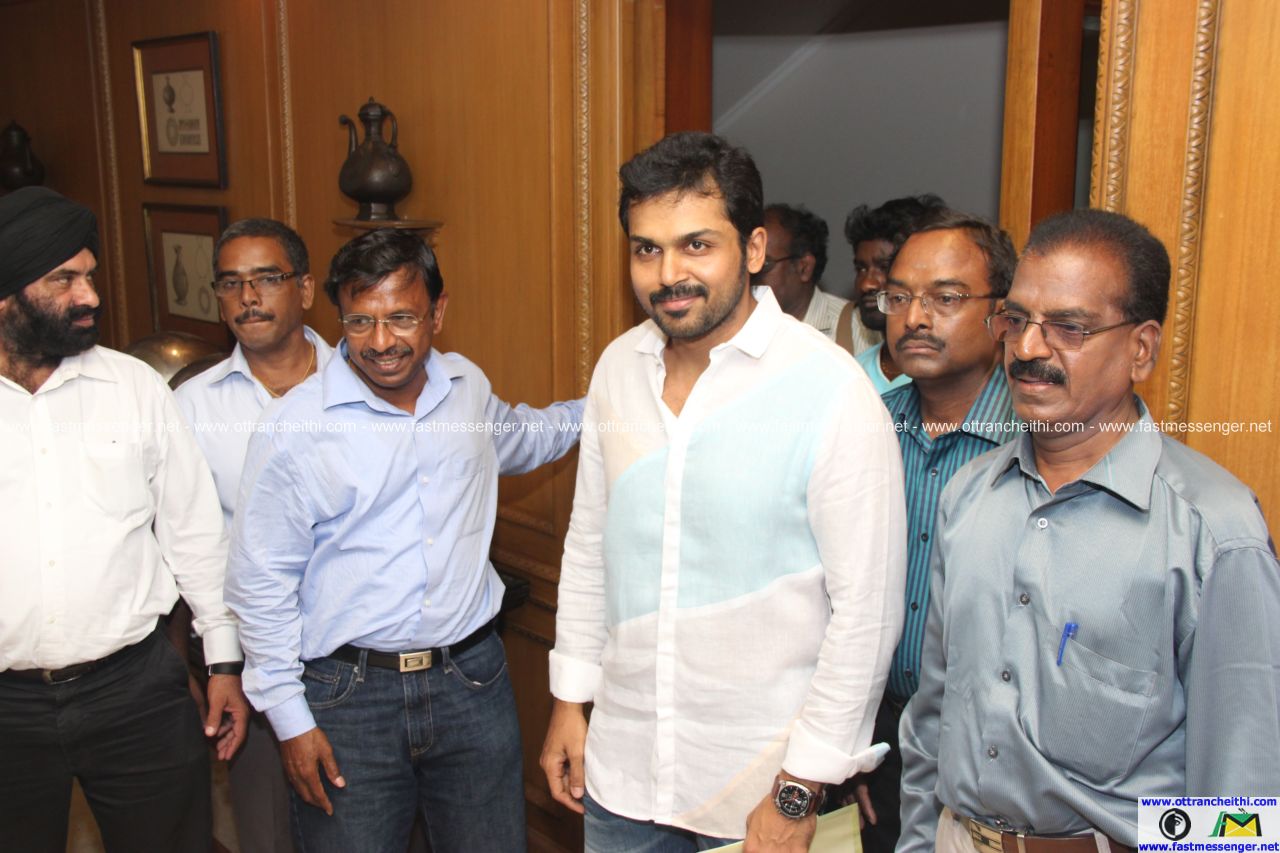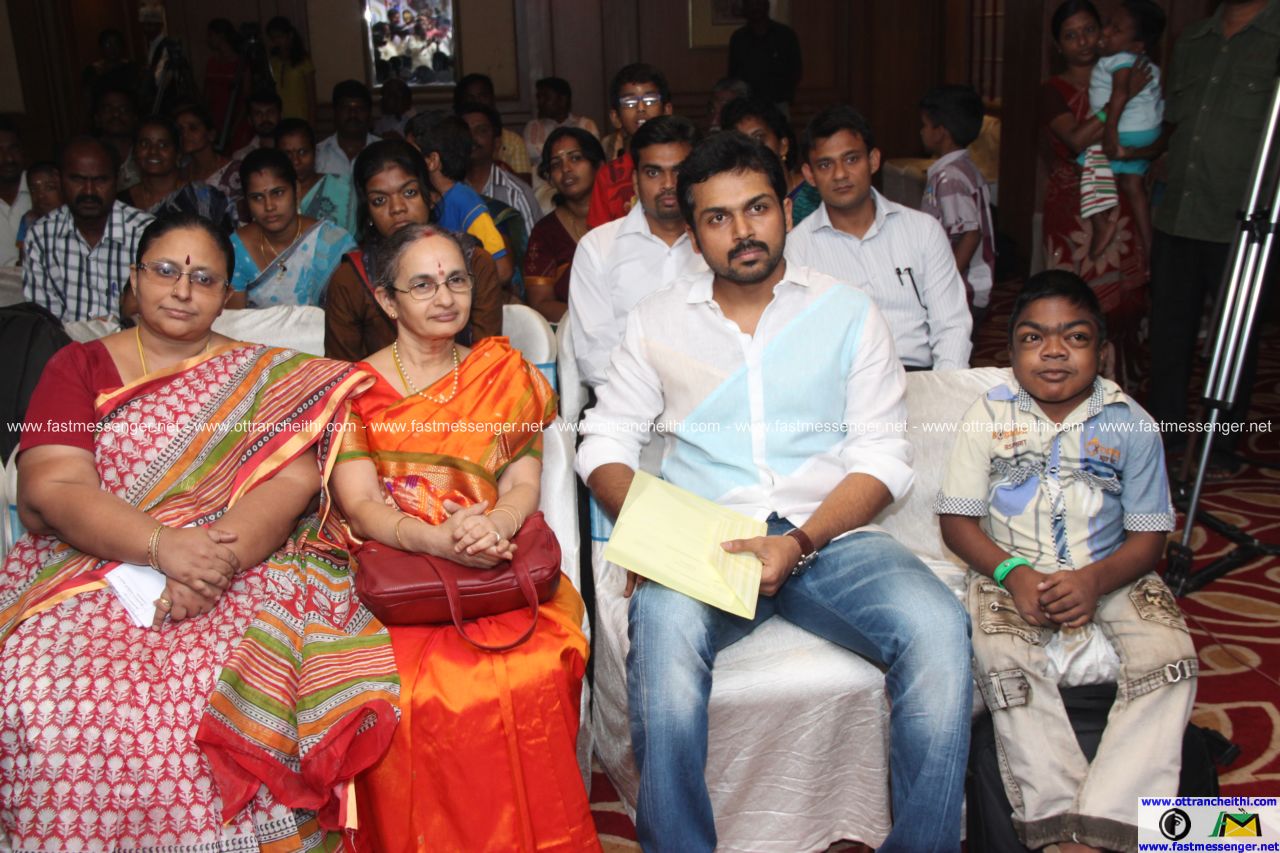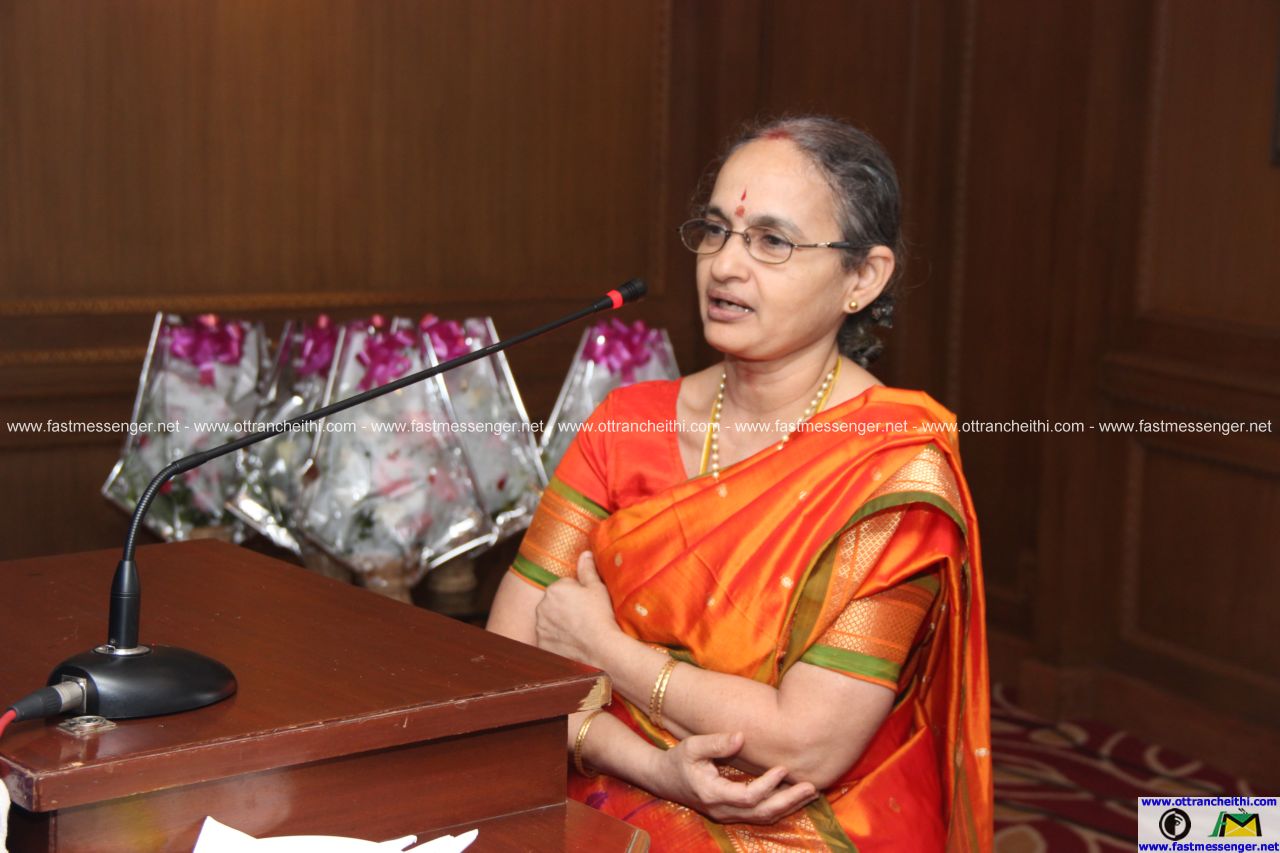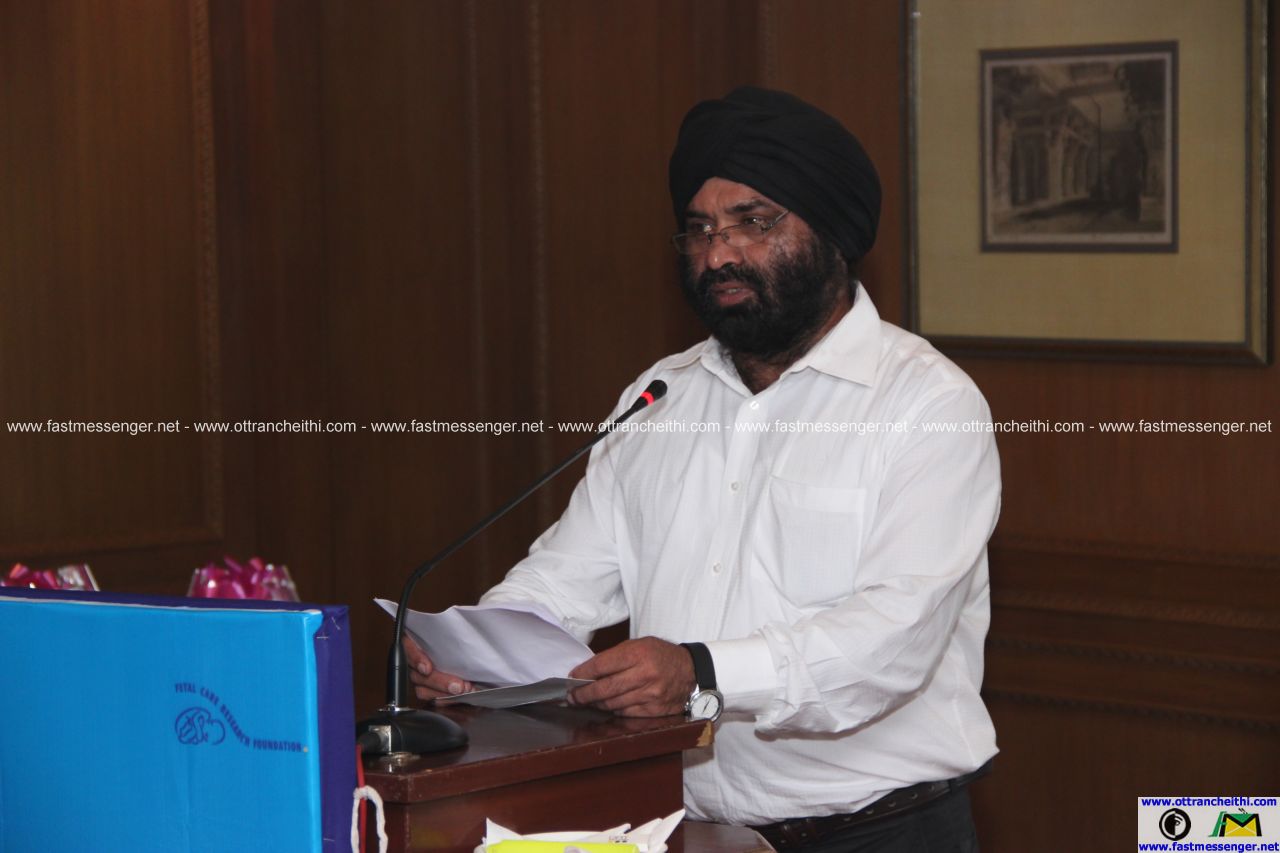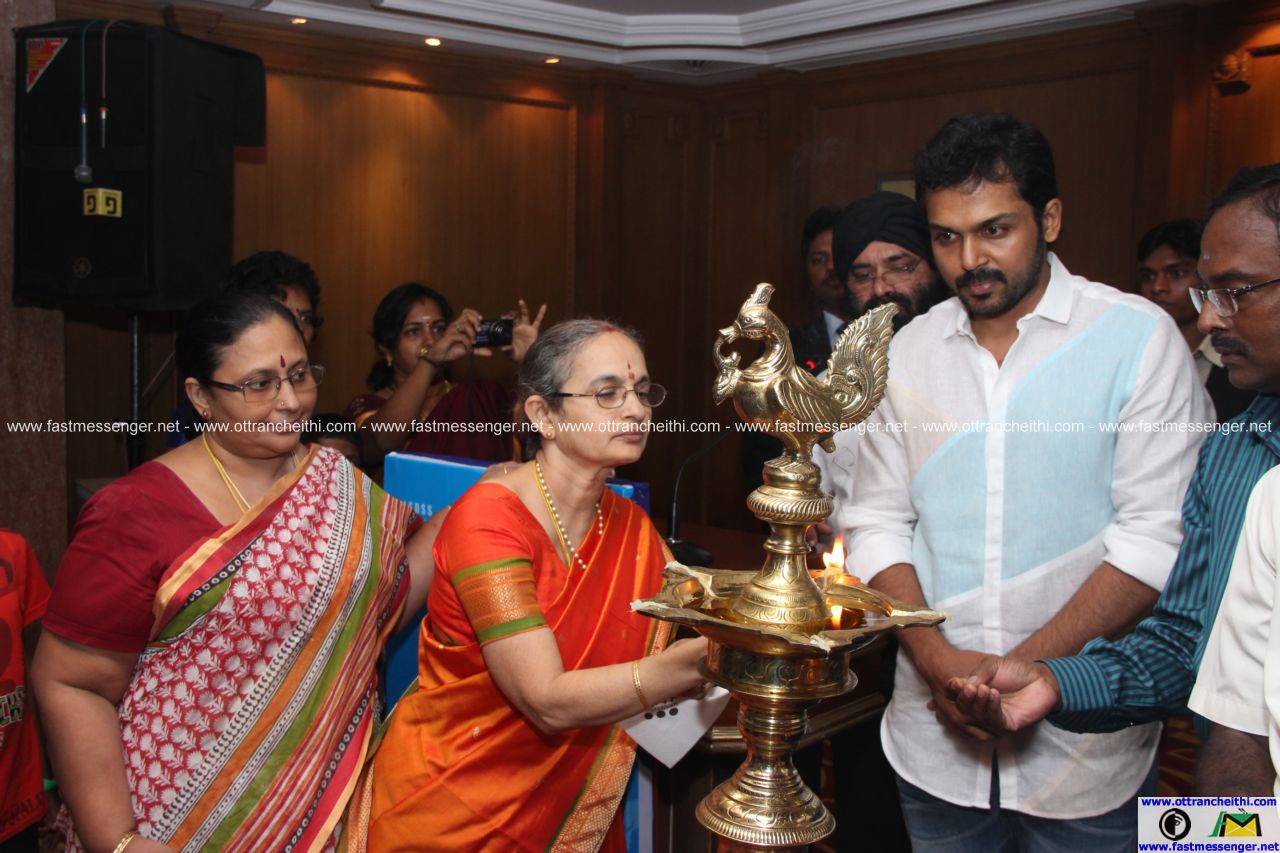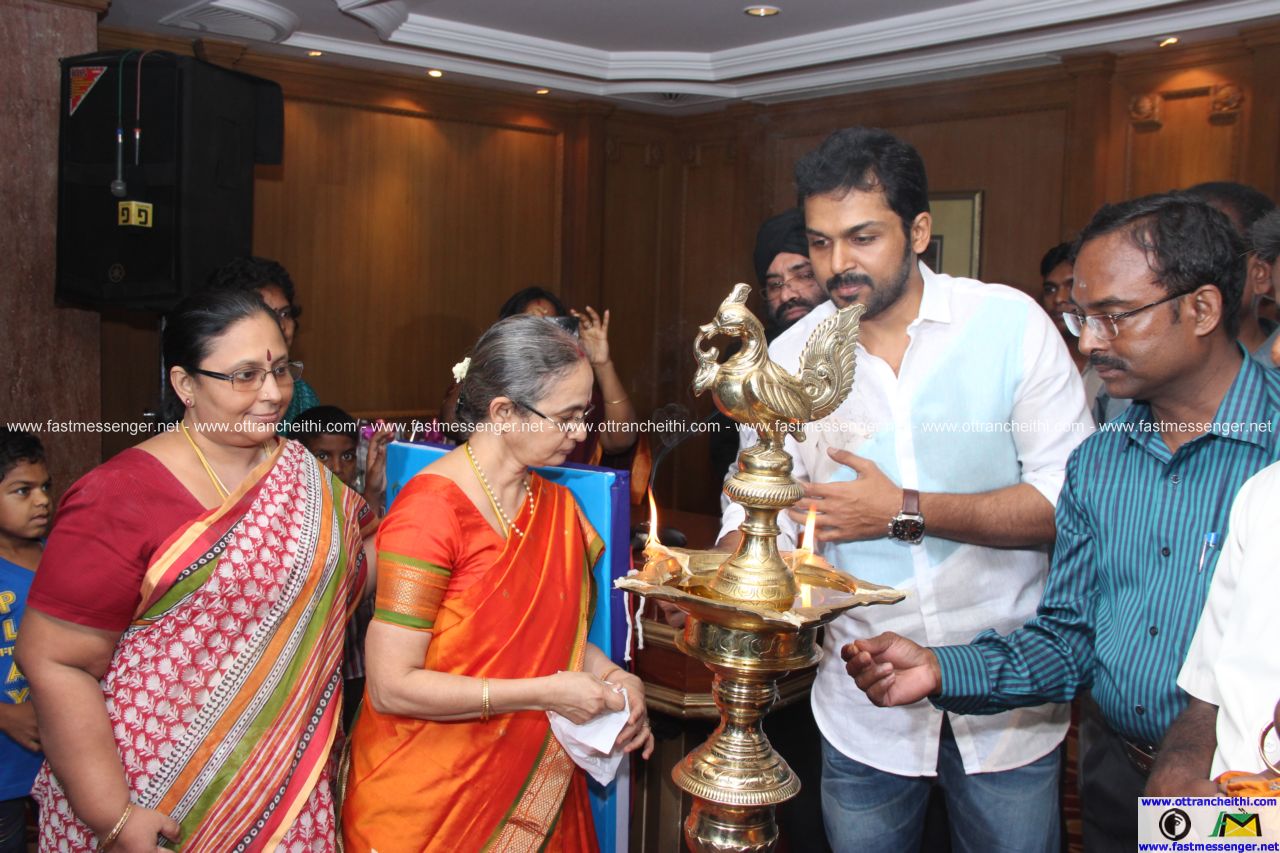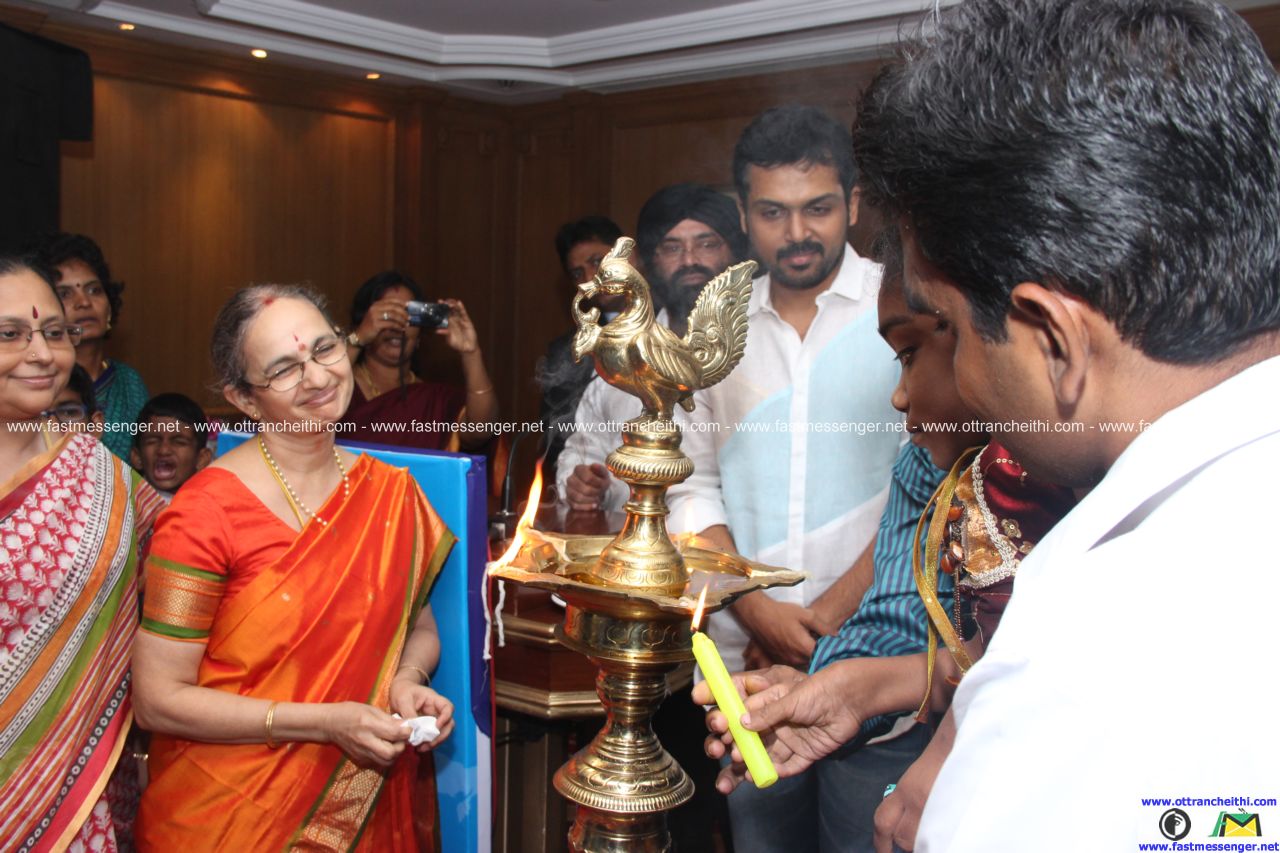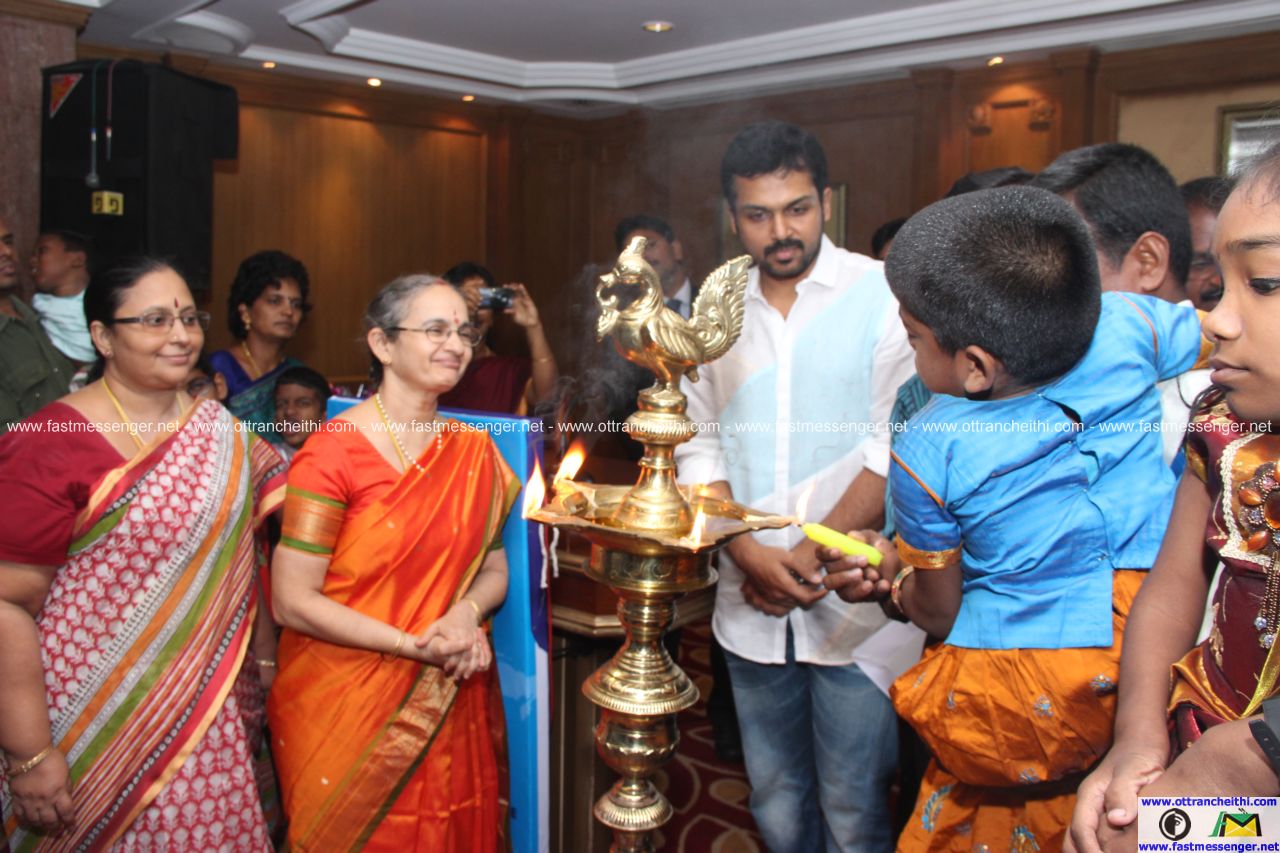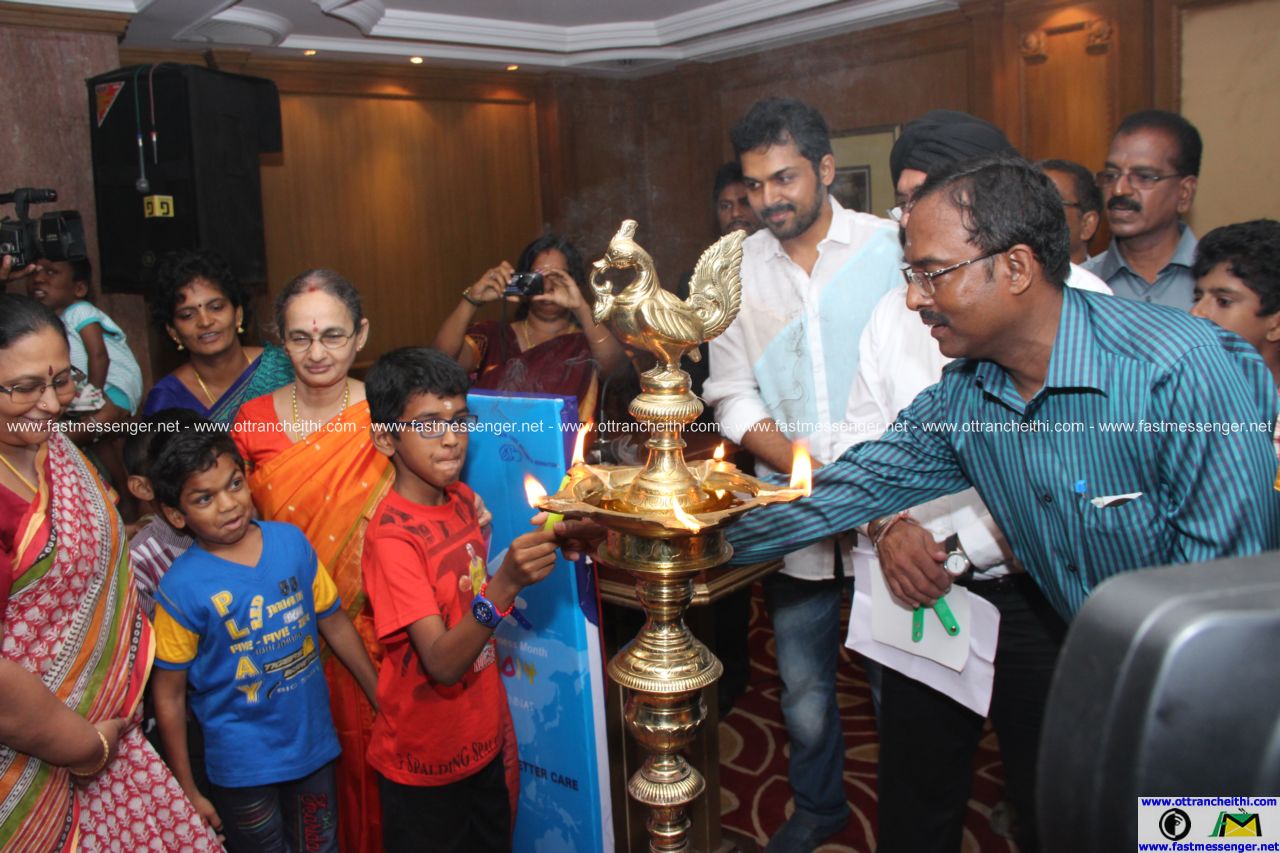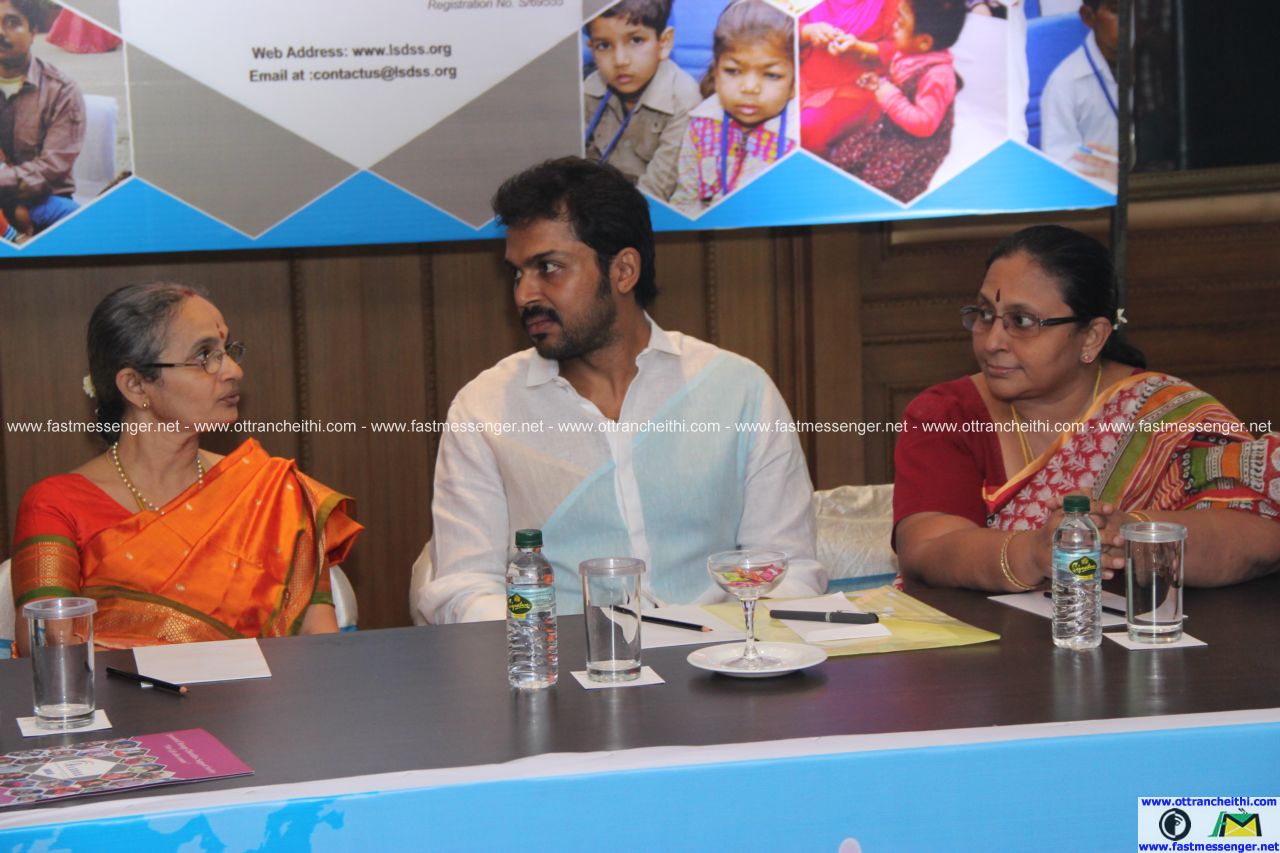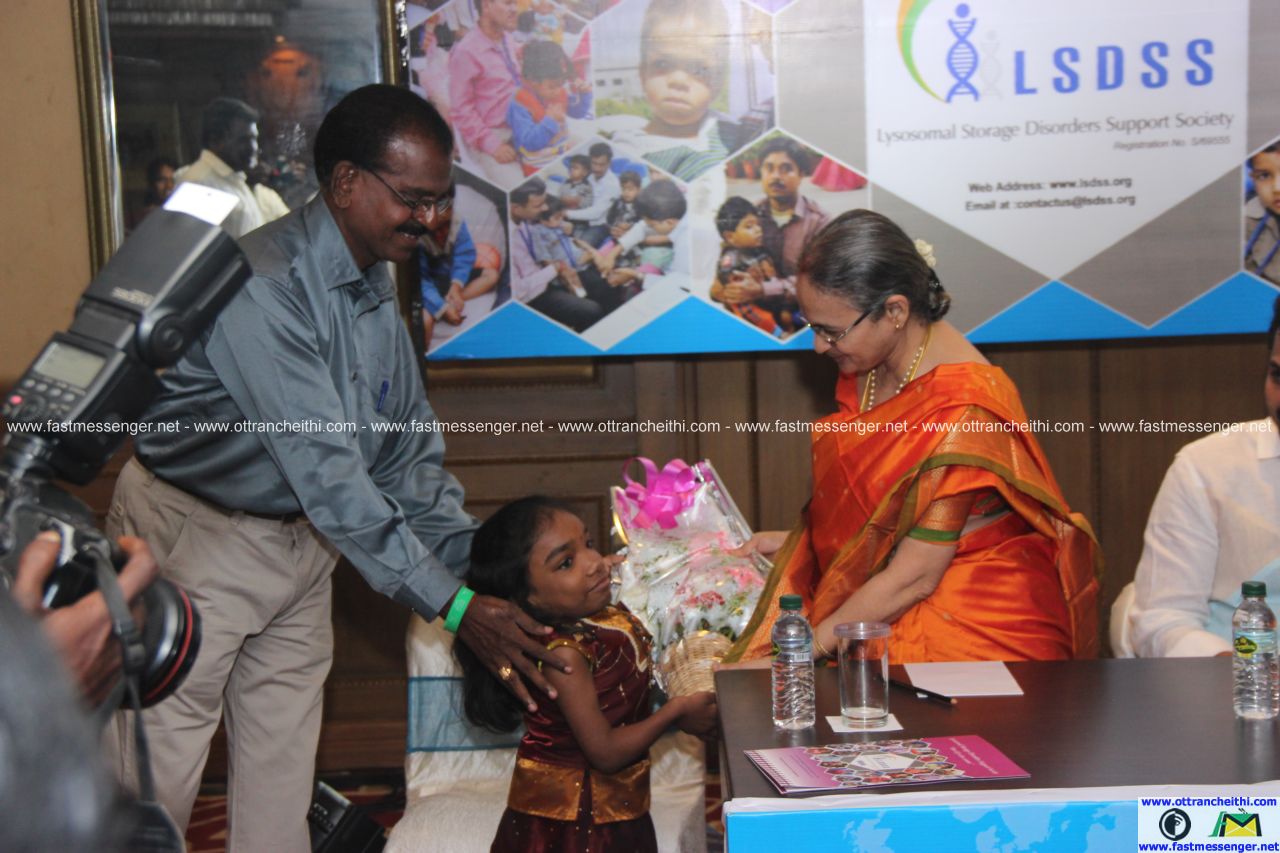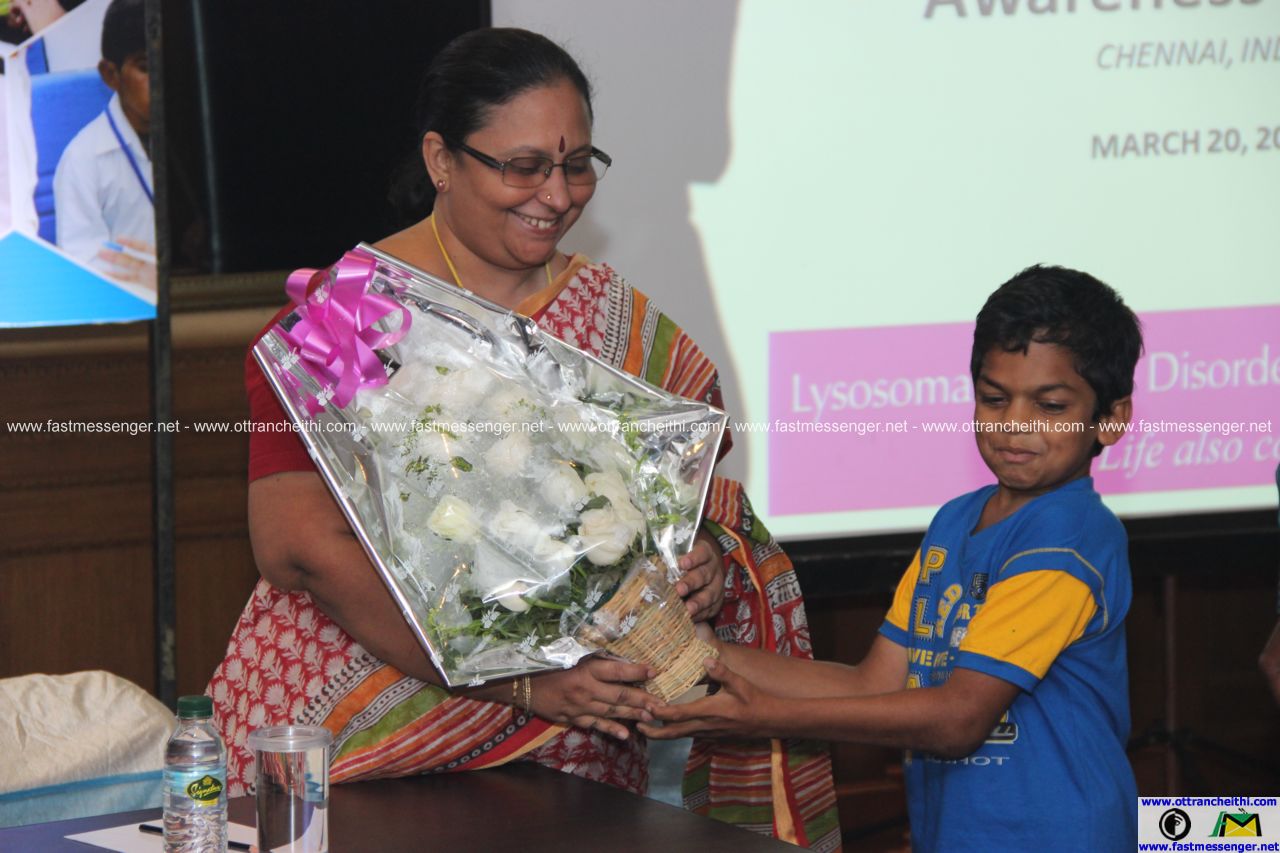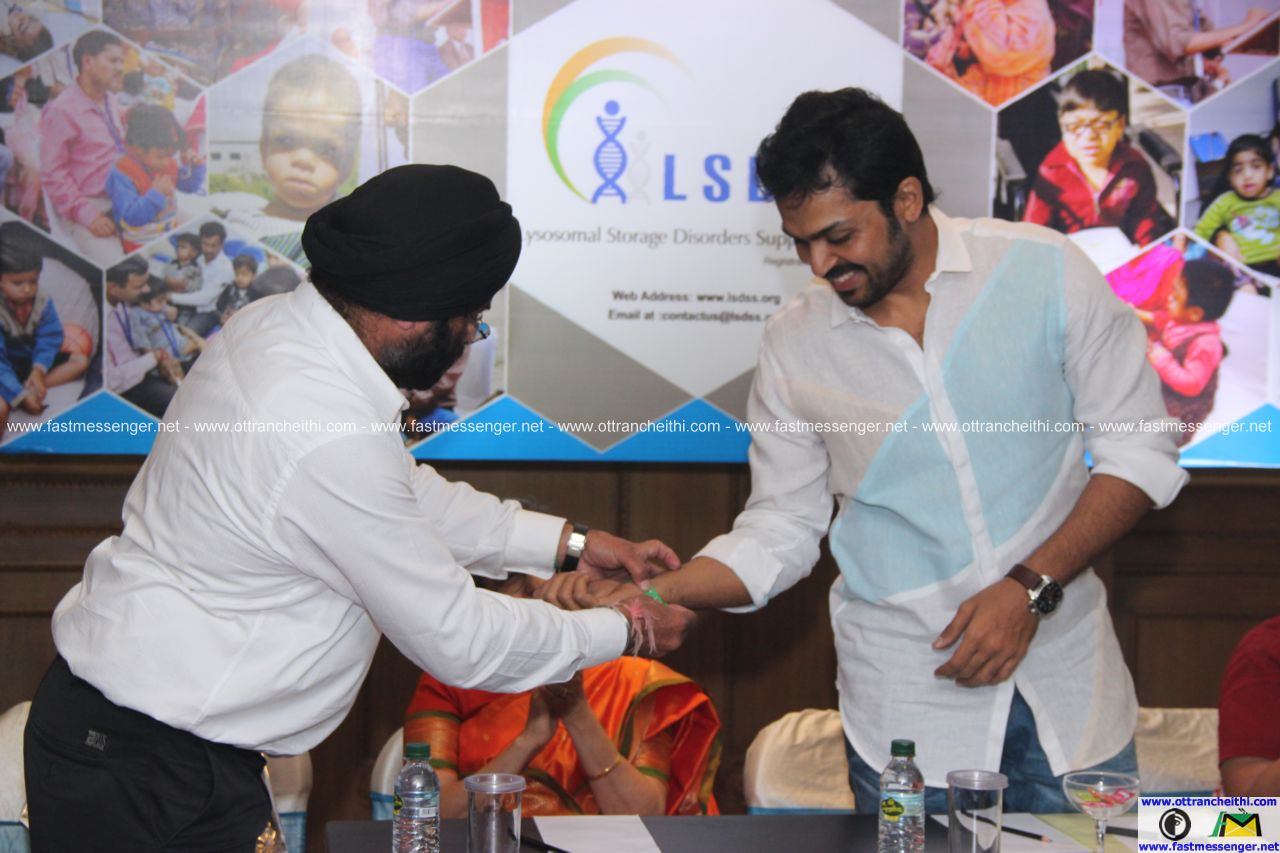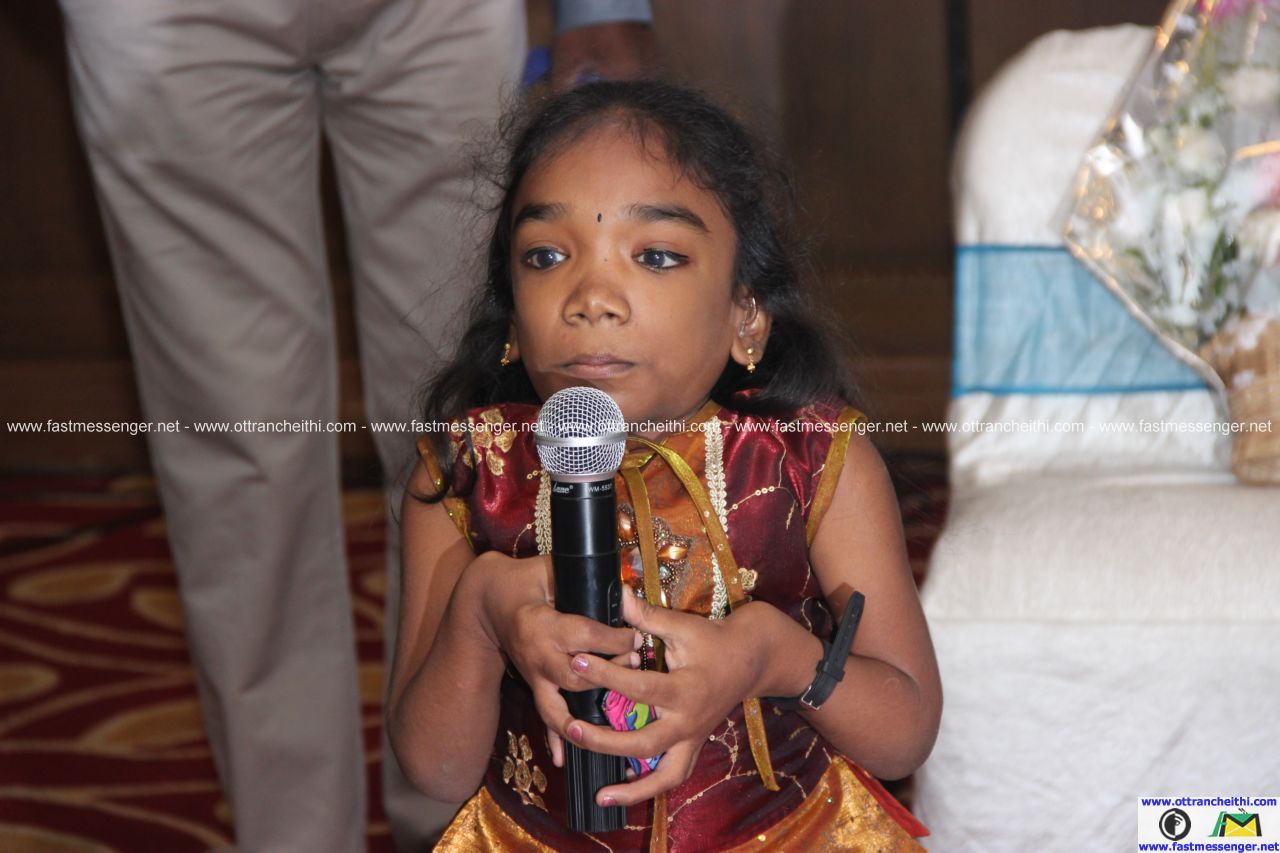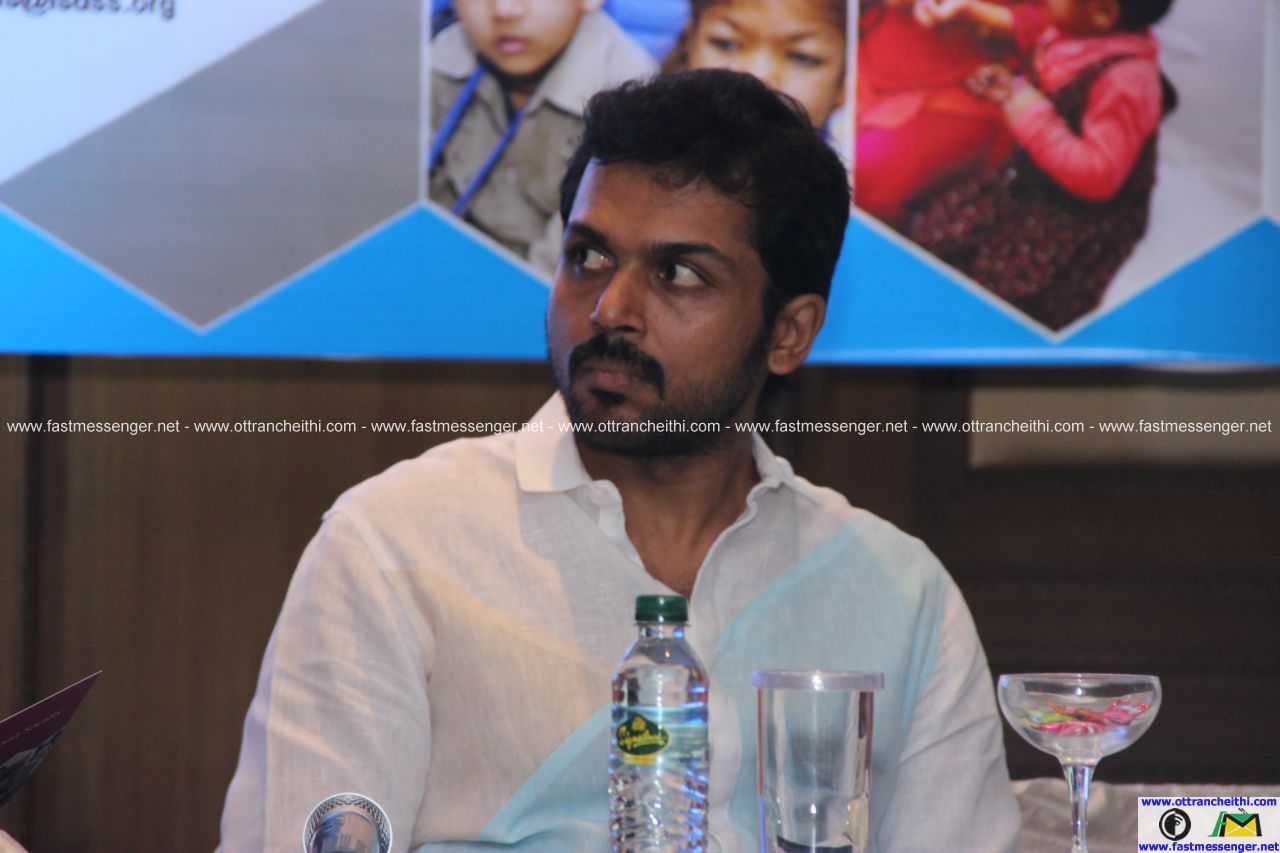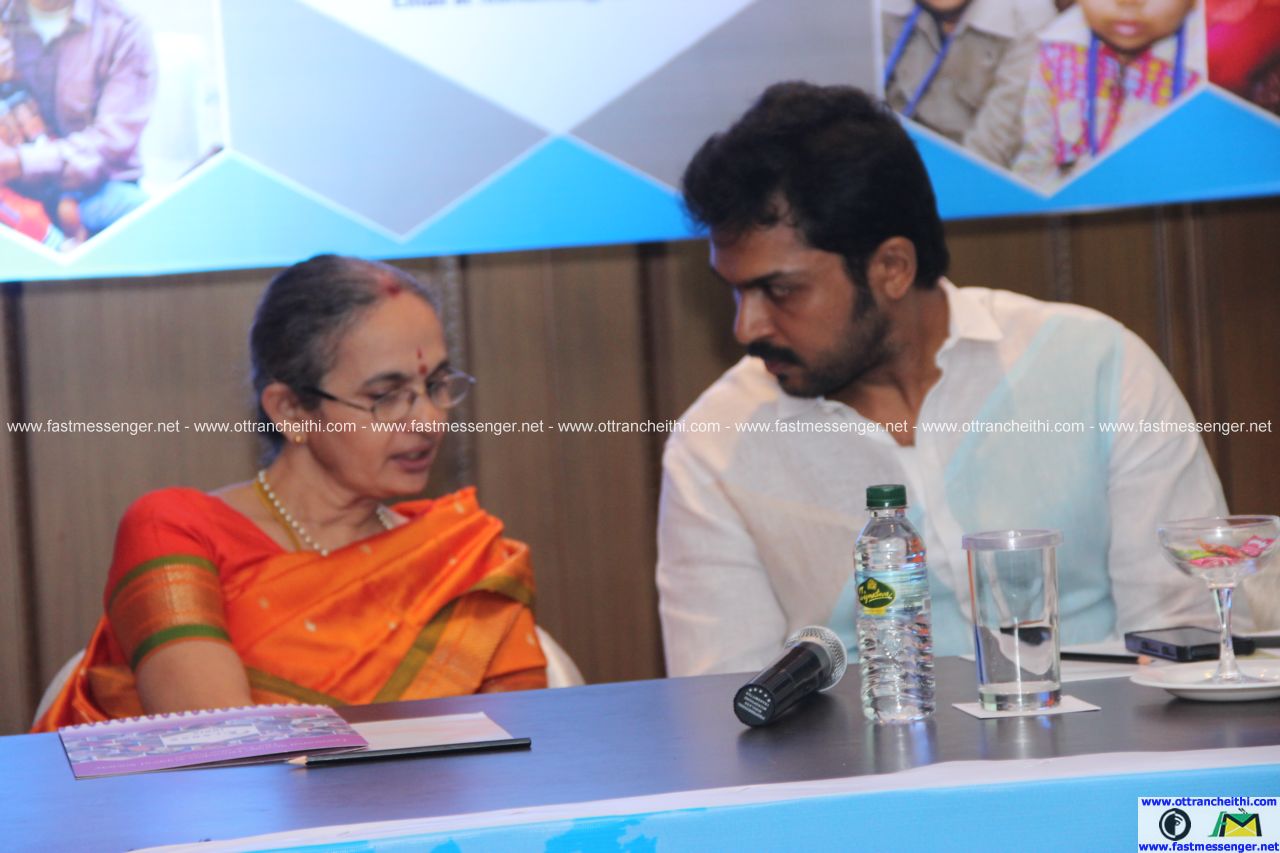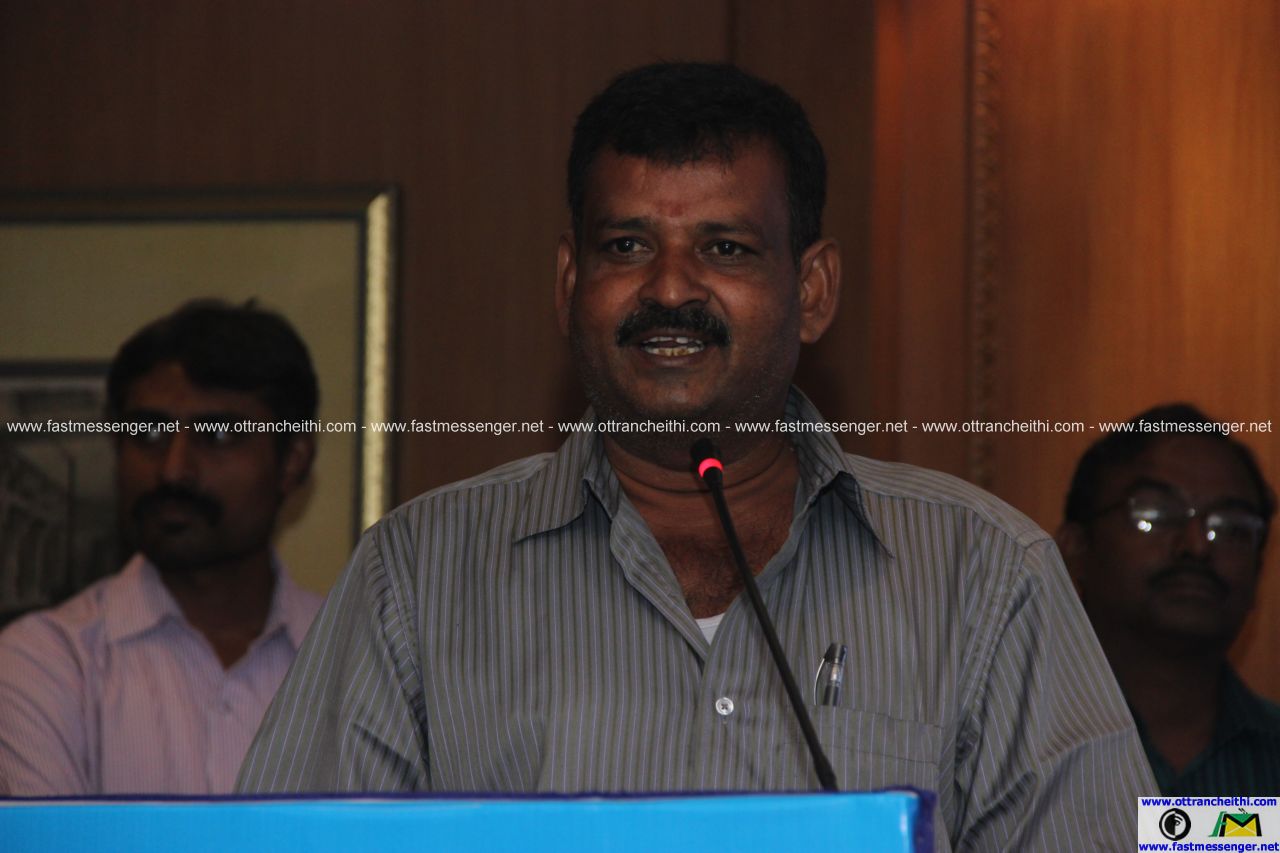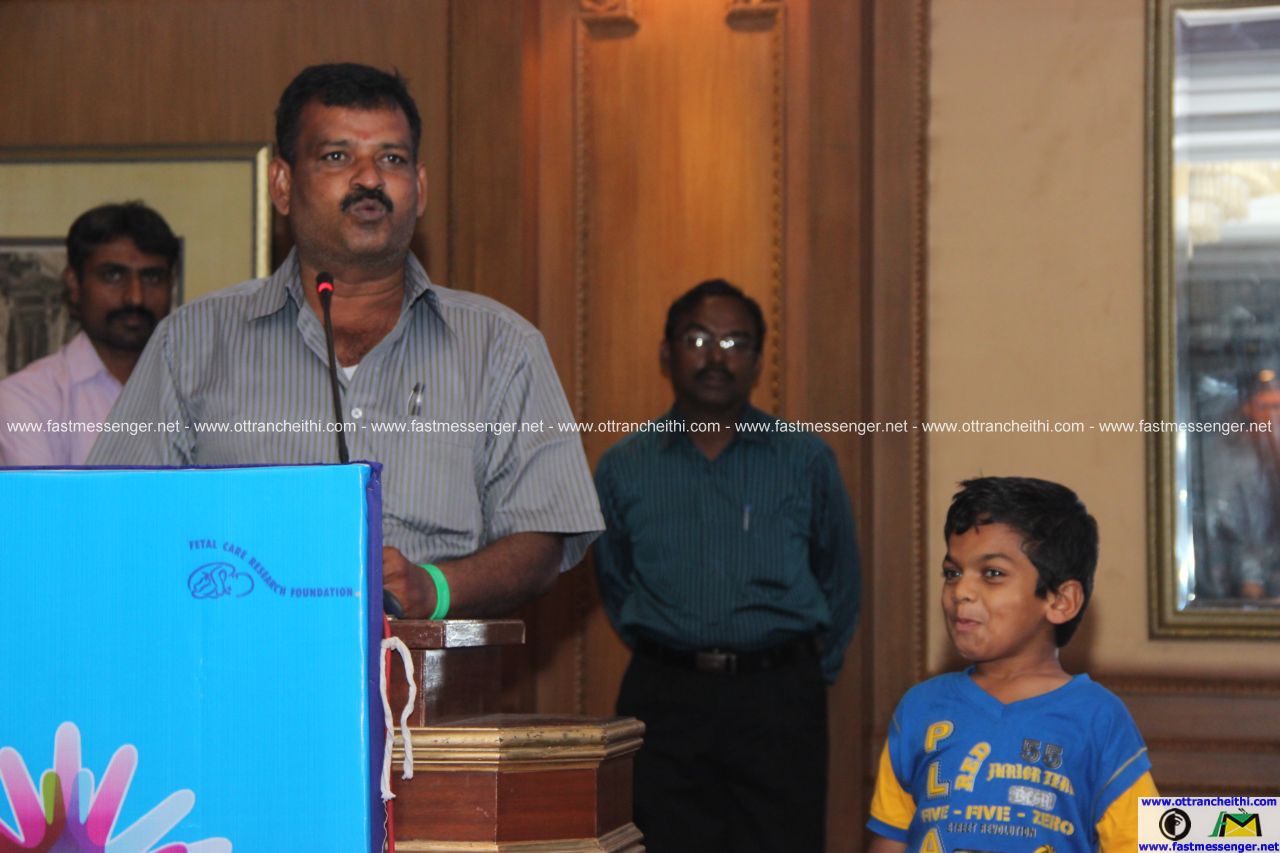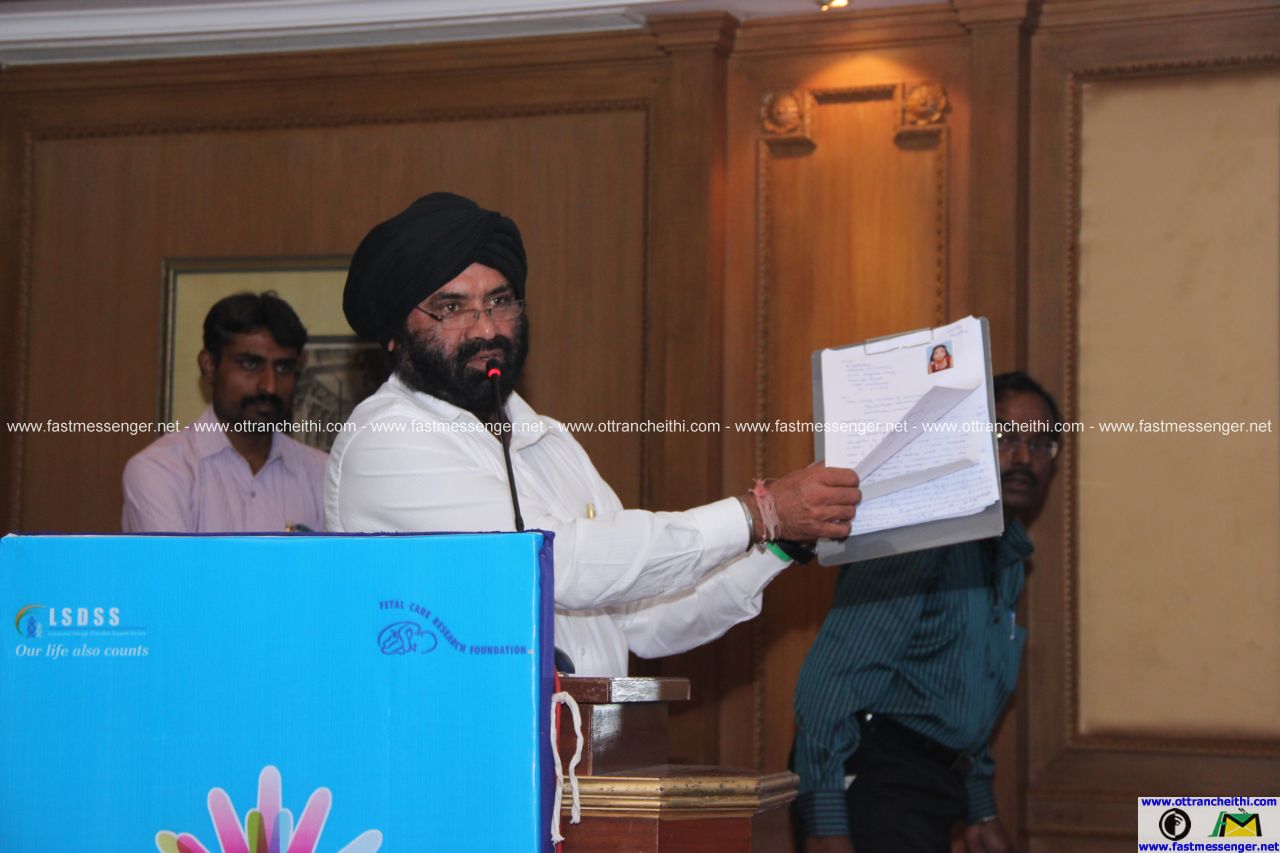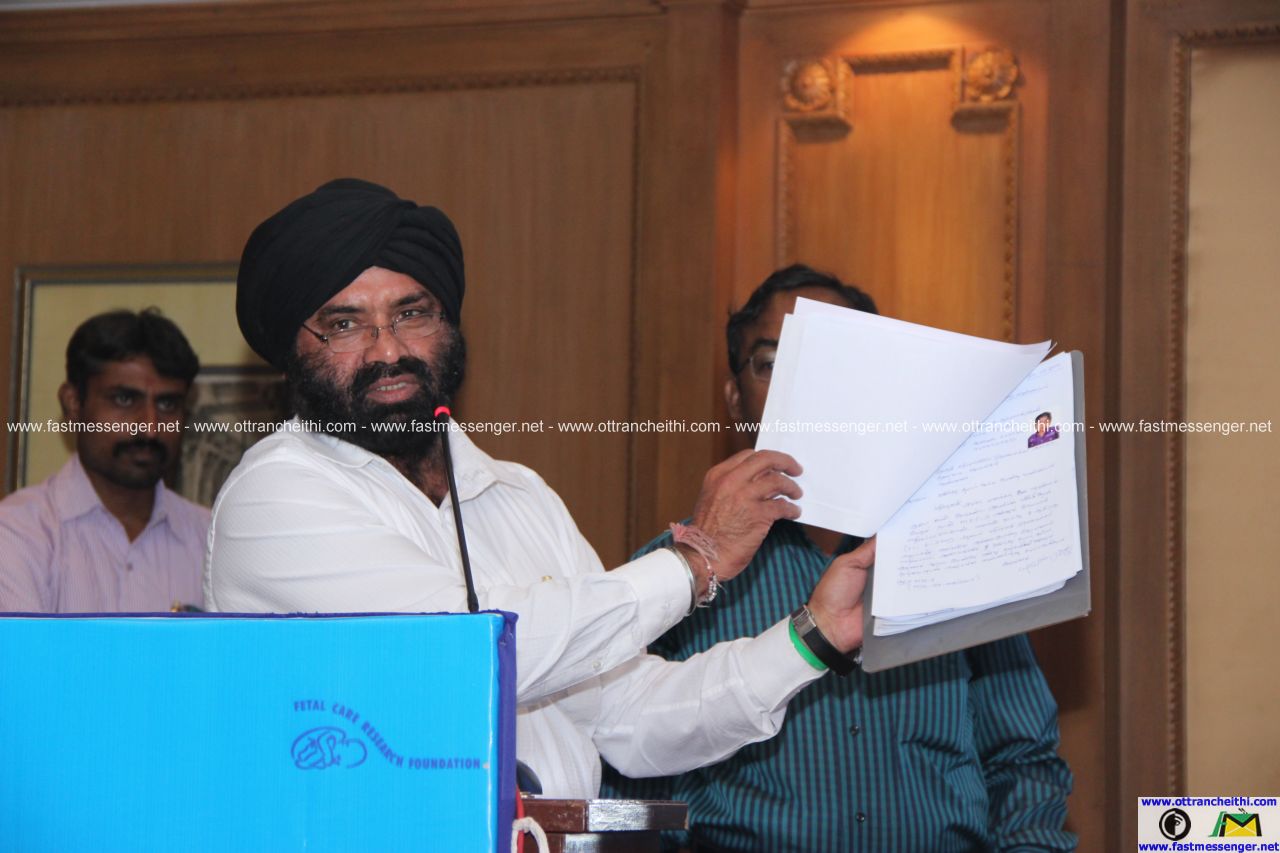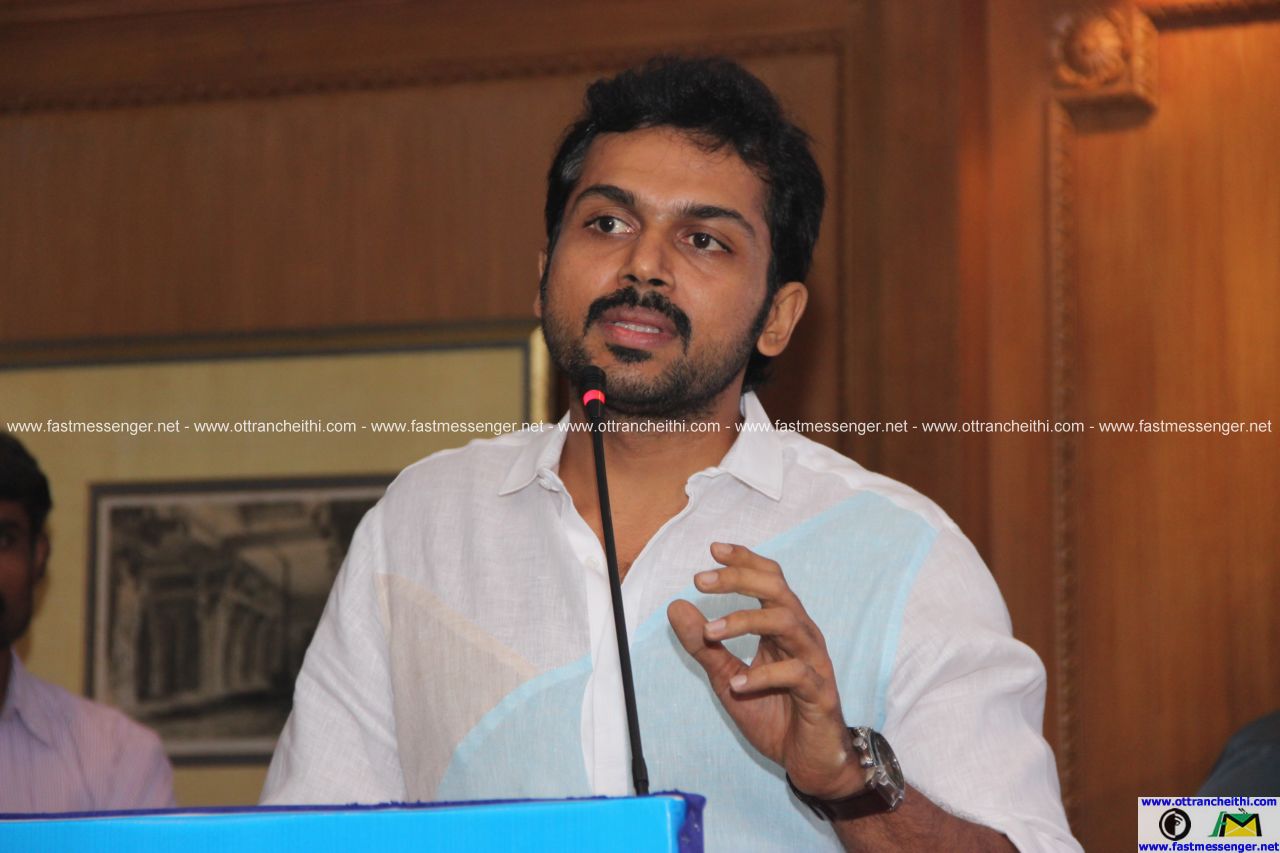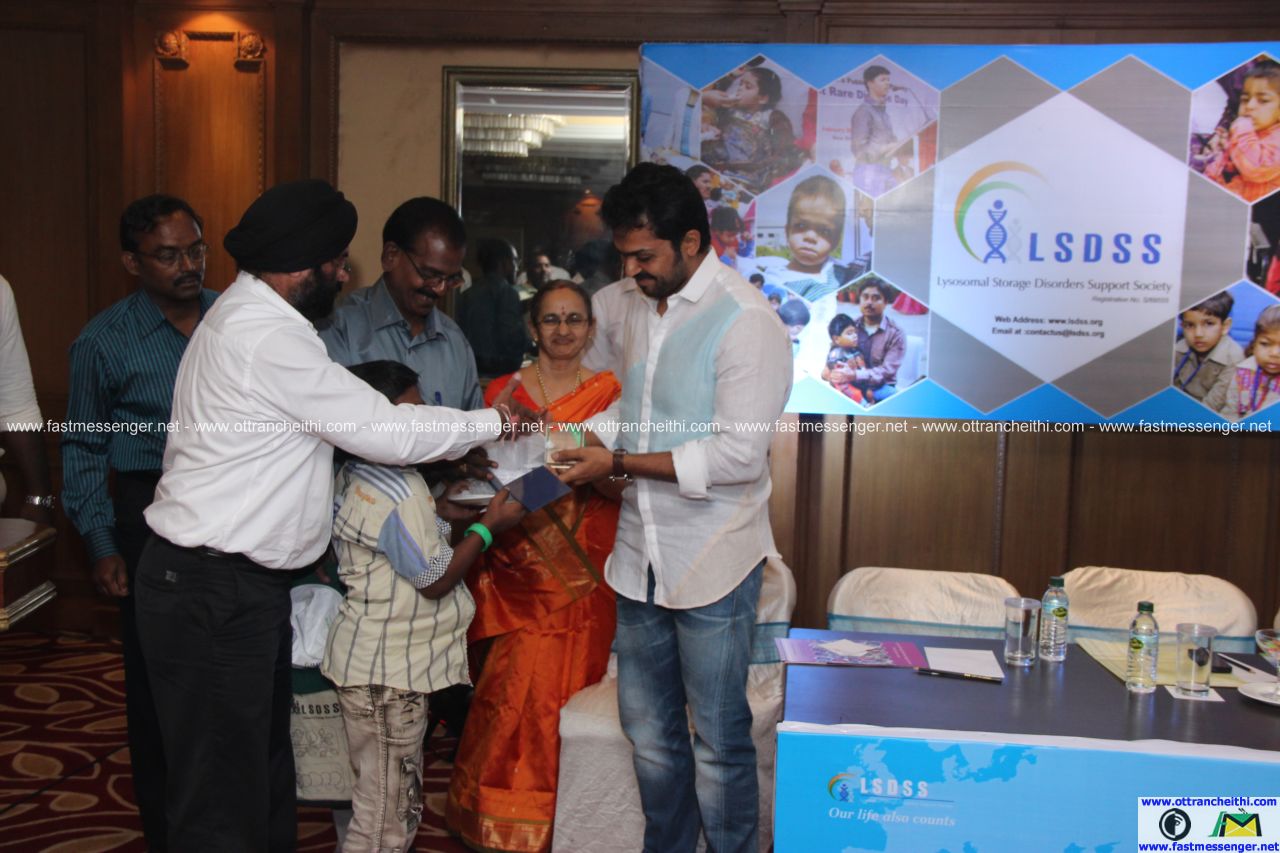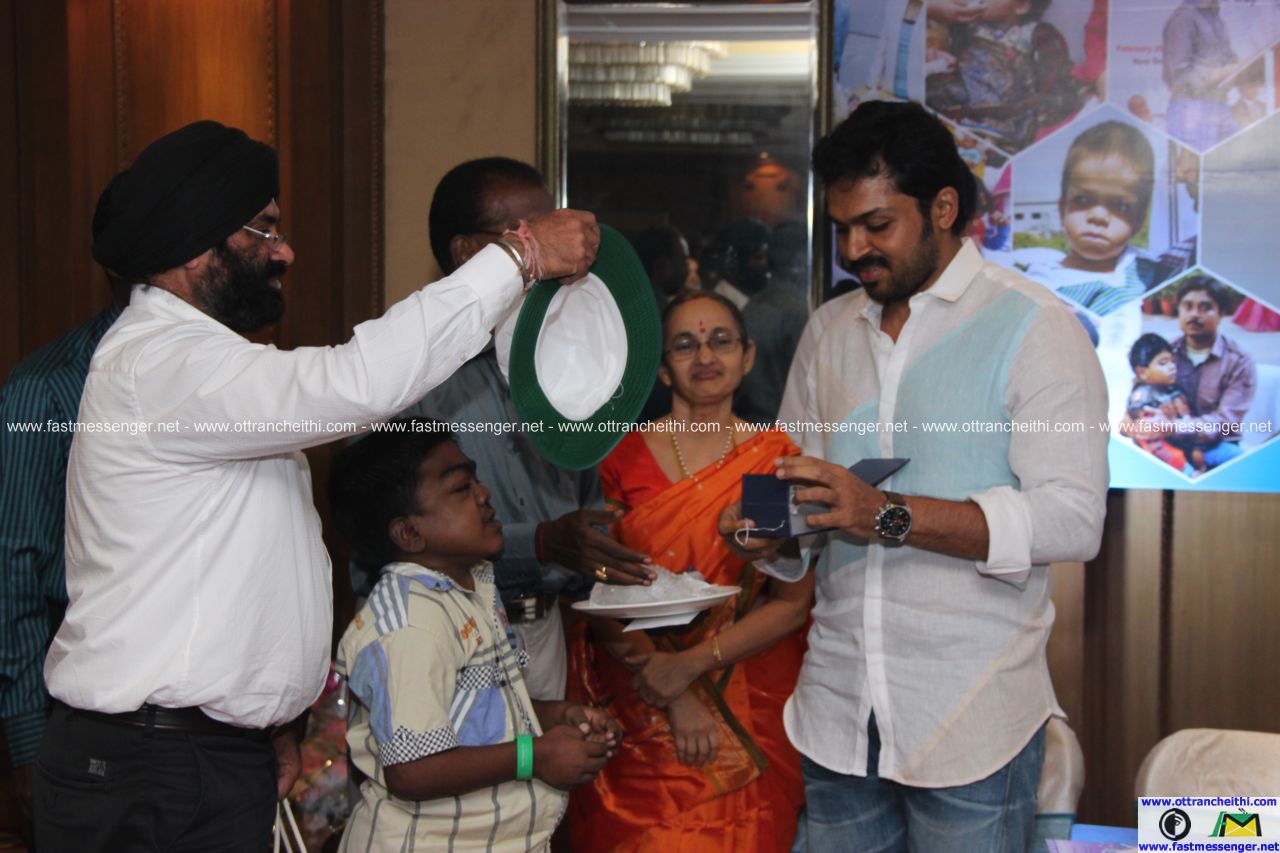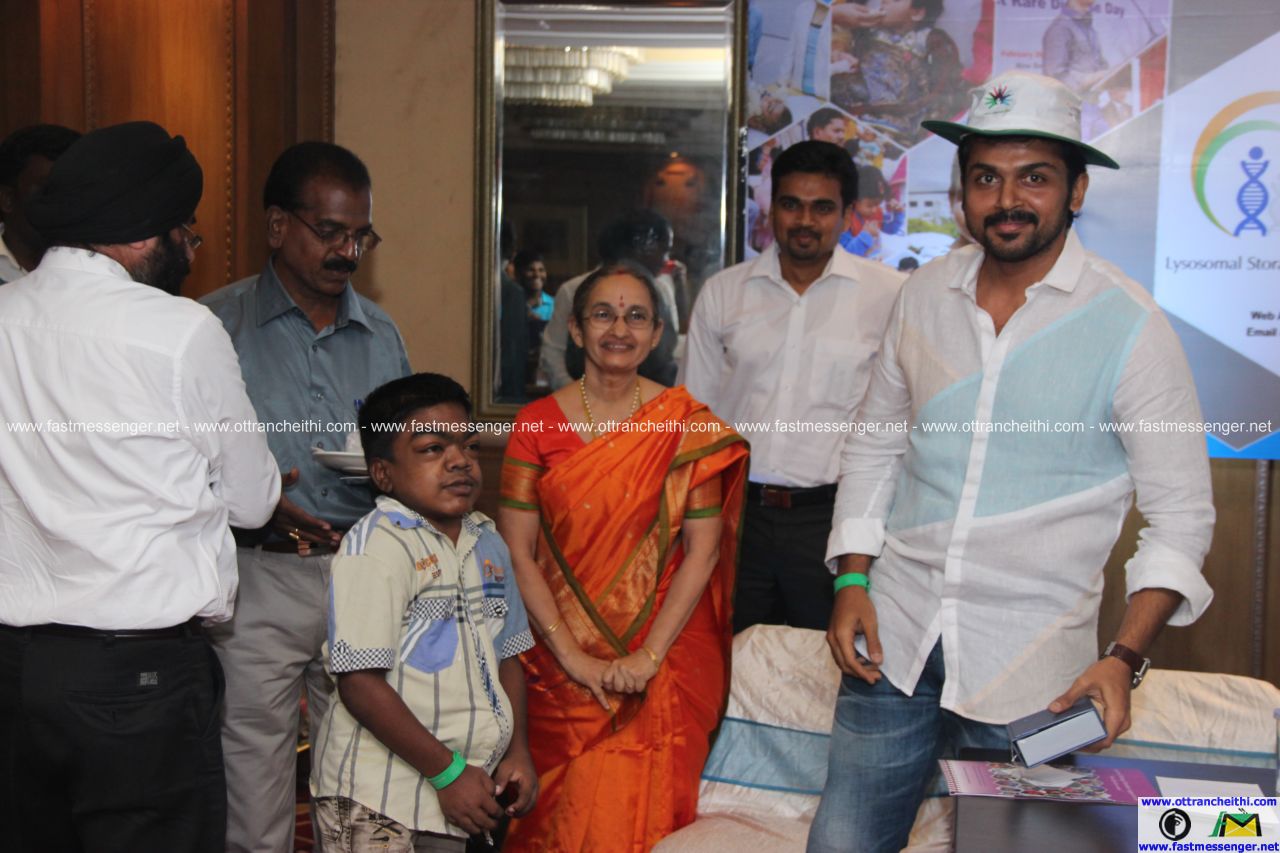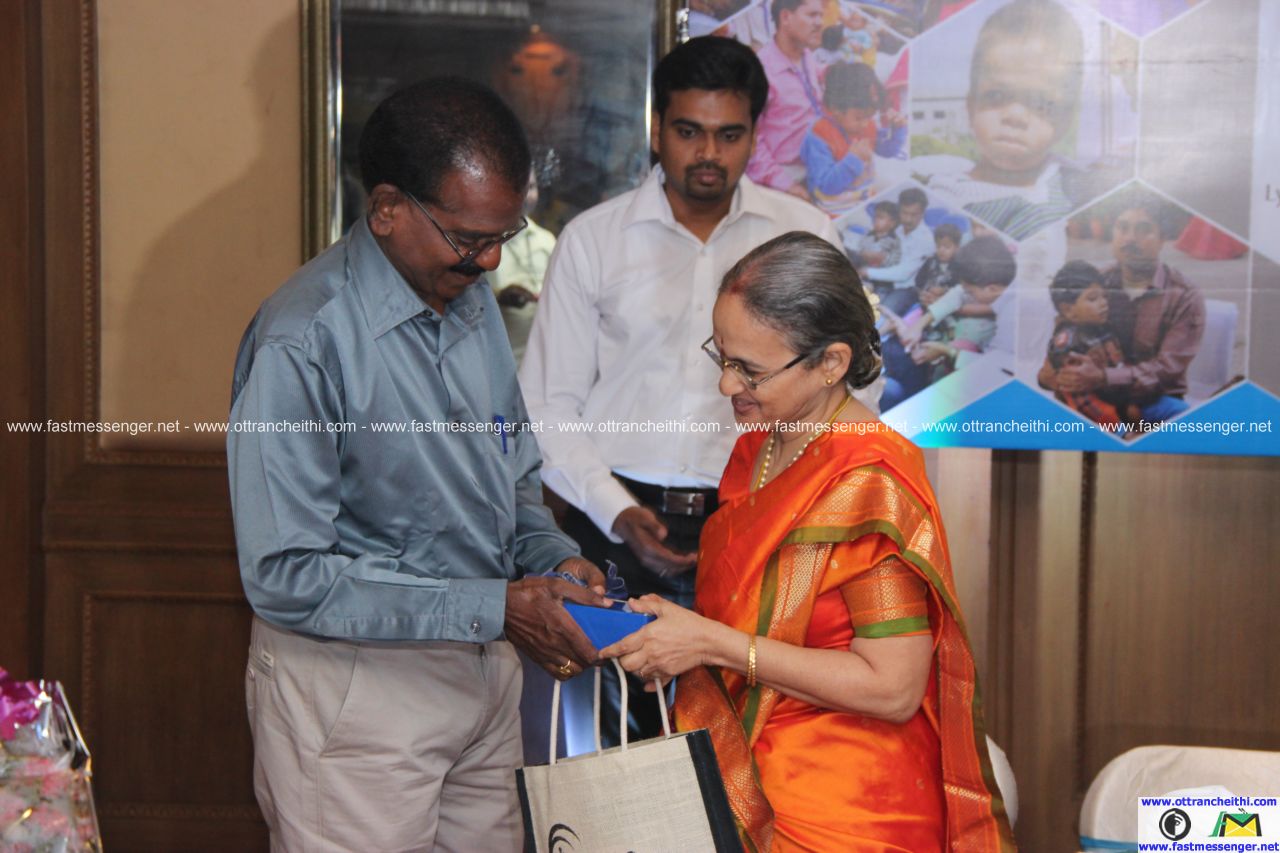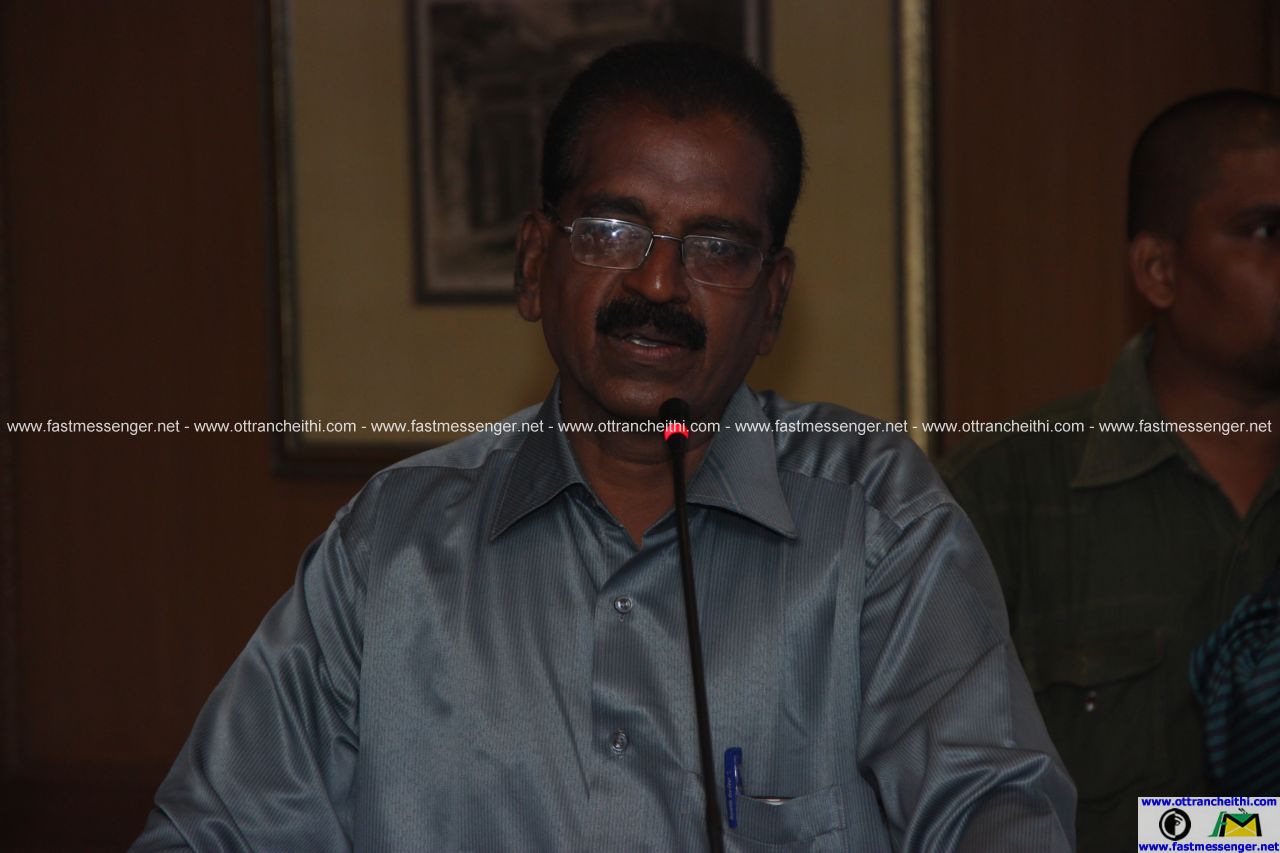Patients of rare life-threatening diseases from across the region gathered to draw attention to their condition and seek government aid for treatment
Actor Karthi on 20th March 2014 came forward to support and motivate the patients suffering from ‘Lysosomal Storage Disorders Support Society’ (LSDSS) to overcome their worries and encourage the afflicted children to stay happy in their daily lives.
The LSDSS in association with Fetal Care Research Foundation (FCRF) had organised a programme to create awareness and understanding among the general public and decision makers about rare diseases and their impact on the occasion of International Rare Disease month. Over 50 Children from across state suffering sought financial assistance for the treatment of these debilitating genetic disorders from the government.
The program witnessed gathering of doctors and young children suffering from extremely rare type of genetic disorders such as Gaucher, MPS, Fabry and Pompe for which there is little or no treatment available. Film Artiste Mr. Karthi Sivakumar triggered tremendous enthusiasm among the children as he graced the occasion with an inspiring speech consoling families of the patients to be brave at the face of adversity.
Speaking on the occasion, Dr Sujatha Jagadeesh, Consultant Clinical Geneticist, Fetal Care Research Foundation said, ” Patients suffering from Lysosomal storage Disorders (LSDs) are few in number therefore their families have to face many hurdles in locating appropriate healthcare facilities and support centres that can provide them proper treatment and care. Even though the treatments of some of these very serious health conditions are available with advancements in medical science but they are beyond the paying capacity of most patients. These children not only need ERT but regular follow up which would include periodic tests and visits to specialists. All this involves a huge cost. Low awareness among medical practitioners often results in delayed diagnosis of LSDs which in turn leads to many avoidable complications.”
Lysosomal storage disorders (LSD) are a group of over 45 rare genetic disorders that occur due to the deficiency of specific enzymes in special compartments (lysosomes) of cells. LSDs occur in about one in 5,000 live births. A majority of LSDs are managed through supportive care measures that are disease-specific. However, six of the LSDs can now be treated through Enzyme Replacement Therapies (ERTs). India currently has about 300-400 patients who have been diagnosed with treatable LSDs.
Appealing to the Union and State Government, actor Karthi said: “on a priority basis a comprehensive scheme should be considered for children with Lysosomal Storage Disorders to ensure timely diagnosis, treatment and supportive care.” Further he appealed that the import duty for life saving medicines should be waived in order to make them affordable to all.
When asked Karthi, whether he would share about LSD and its difficulties to his friends colleagues, he said that his friends and colleagues where engaged in serving for the other different diseases. He assured that he would explain about LSD and it difficulties to his friends and colleagues and would request them to share about it on social pages like Facebook, Twitter and other.
Present among the patients was the 8-year-old Master Pawan who was 3 years old when he was diagnosed with Gaucher disease – a life threatening condition, caused by a deficiency of the enzyme glucocerebrosidase, which leads to a collection of fatty material in the spleen, liver, kidneys, lungs, brain, and bone. But he was one of the lucky few as his father discovered the treatment availability and the management of Gaucher’s disease, that too free of cost.
With tearful eyes, Pawan’s father said, “I was completely shattered after knowing that my child suffered from a rare genetic disorder. My son is lucky to be blessed with a free treatment, but there are many other children who are not so lucky. The treatments available for the curable LSDs need to be taken lifelong and beyond the capacity of any common man and. I, on behalf of many families, urge the government to take immediate action to make treatment available for the patients and help all children lead normal lives.”
Appealing to the Government of Tamilnadu, Manjit Singh, President of Lysosomal Storage Disorders Support Society said: “Only government support can save these people and help such patients lead a dignified life. The need of the hour is a government scheme to provide free treatment for patients with rare disorders. They are very few in number and it is the duty of the state to provide treatment for them.”
About LSD Support Society
The LSD Support Society (LSDSS) is a group comprising patients, families and caregivers who know what it’s like to live with LSDs. LSDSS aims to create a strong voice for LSD patients in India by forming a strong national support group. LSDSS campaigns for early diagnosis, effective, affordable and safe therapies for rare diseases such as Gaucher, MPS, Fabry and Pompe. It also strives to provide information and support to all patients, their families and others with interests in rare diseases.
Keeping in mind the low awareness levels on LSDs, the LSDSS organizes events to make the general public and decision-makers aware about rare disorders and their impact on the lives of the patients’ and their families.
Fast Facts on Lysosomal Storage Disorders (LSDs)
What are LSDs?
Lysosomal storage disorders (LSD) are a group of around forty five (45) rare, genetic disorders that occur due to the deficiency of specific enzymes in special compartments (lysosomes) of the cells. These deficiencies cause material to get inappropriately stored in these special compartments of the cells. Overtime, the amount of material building up in each lysosome causes it to swell and occupy more space in the cell, leading to additional problems for normal cellular function. Cells thus become dysfunctional and may die, resulting in a wide variety of clinical symptoms.
What are the Symptoms of LSDs?
These disorders affect multiple organs and cause progressive physical and/or mental deterioration over time. Symptoms vary from mild to severe, depending on the disorder and variables like age of onset.
They can include developmental delay, movement disorders, seizures, dementia, deafness and/or blindness. Some people with LSDs have enlarged liver (hepatomegaly) and enlarged spleen (splenomegaly), pulmonary and cardiac problems, and bones that grow abnormally.
How are LSDs diagnosed?
Due to the involvement of multiple organs, LSDs can often be mistaken for other disorders. Diagnosis based purely on clinical observations is rarely conclusive and diagnostic testing is required. The main method of validating a clinical suspicion is by means of a simple blood test – either by using a whole blood sample or a blood spot dried on a filter paper. In addition, after a diagnosis is made by biochemical means, mutation analysis may be performed for certain disorder.
What is the incidence of LSDs?
• LSDs occur in about one in 5,000 live births.
• The incidence of treatable LSDs ranges from 1 in 30,000 to 1 in 400,000 births.
Management:
A majority of LSDs are managed by means of supportive care measures that are disease specific.
However, six of the LSDs can now be treated by means of Enzyme Replacement Therapies (ERTs).
The principle of ERT is to replace specific defective enzymes in LSD patients with in vitro synthesized functional enzymes. ERT products are administered by intravenous infusion, dosages determined by patient body weight, usually every other week, for the life of the patient. Currently, ERTs for six of LSDs, namely, Gaucher Type I, Fabry’s disease, Pompe disease, MPS I (Hurler disease), MPS II (Hunter disease), MPS VI (Maroteaux-Lamy syndrome) are available.
LSDs & India
• In India, around 500 babies are likely to be affected every year by treatable LSDs.
• Currently, there are around 8-10 centres of excellence in India for the management & treatment of LSDs, and 6-8 centres that have the diagnostic capabilities.
• Around 80 children currently receiving ERTs under the Charitable Access Program of a US company.
This is overseen by a group of national and international experts in the field of genetics.


